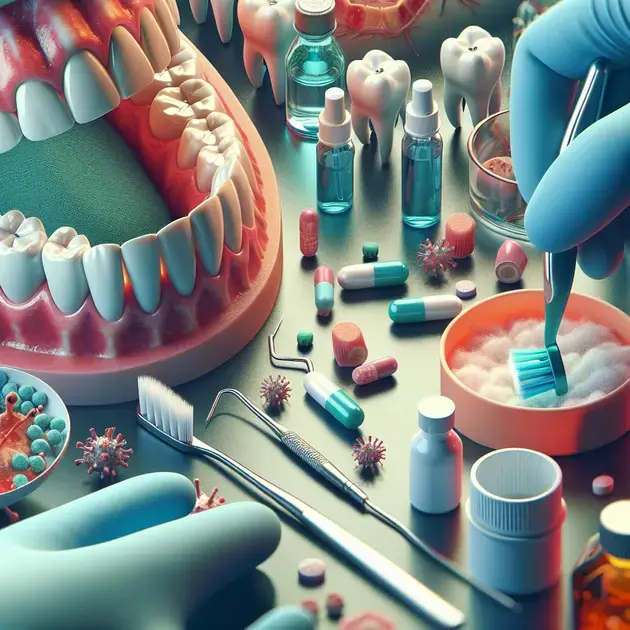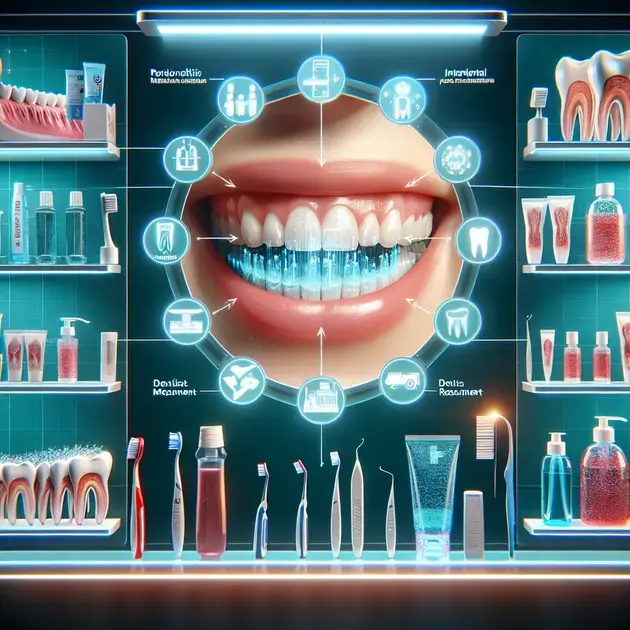Periodontitis is a common oral health problem that affects millions of people worldwide. It is a serious gum infection that damages the soft tissue and destroys the bone that supports your teeth. Without proper treatment, periodontitis can lead to tooth loss and other complications. In this comprehensive guide, we will discuss the most effective medications for treating periodontitis.
Recent studies have shown that a combination of antibiotics and antimicrobial mouth rinses can be highly effective in managing periodontitis. These medications help to eliminate the harmful bacteria causing the infection and reduce inflammation in the gums. Along with professional dental cleanings and good oral hygiene practices, effective medication can play a crucial role in controlling periodontal disease.

Understanding Periodontitis: Causes and Symptoms
Periodontitis is a serious gum infection that damages the soft tissue and destroys the bone that supports your teeth. It is caused by bacteria found in plaque, the sticky film that forms on teeth. If left untreated, periodontitis can lead to tooth loss and other health issues. Some common causes of periodontitis include poor oral hygiene, smoking, genetic factors, and certain medical conditions like diabetes.
To identify the symptoms of periodontitis, watch out for signs such as swollen or bleeding gums, persistent bad breath, loose teeth, and receding gums. If you notice any of these symptoms, it is important to see a dentist promptly for diagnosis and treatment.
To learn more about the causes and symptoms of periodontitis, visit reputable websites like the American Dental Association (ADA) or the National Institute of Dental and Craniofacial Research (NIDCR).
The Role of Antibiotics and Mouth Rinses in Treating Periodontitis
Antibiotics and mouth rinses play a crucial role in the treatment of periodontitis by targeting the bacteria that cause gum disease. Antibiotics may be prescribed in pill form or as a mouth rinse to reduce the number of bacteria in the mouth and aid in healing. Mouth rinses containing antimicrobial agents like chlorhexidine can also help control bacterial growth and reduce inflammation.
When using antibiotics or mouth rinses for periodontitis, it is important to follow your dentist’s instructions carefully and complete the full course of medication. Additionally, practicing good oral hygiene habits such as brushing twice a day, flossing, and using an antibacterial mouth rinse can enhance the effectiveness of treatment.
For more information on antibiotics and mouth rinses for treating periodontitis, consult resources like the Centers for Disease Control and Prevention (CDC) or the American Academy of Periodontology (AAP).
Professional Cleanings and Oral Hygiene Practices for Managing Periodontal Disease
Professional cleanings by a dental hygienist are essential for managing periodontal disease. During a cleaning appointment, the hygienist will remove plaque and tartar buildup from your teeth and gums, helping to prevent further progression of gum disease. These cleanings are typically recommended every 3 to 6 months for individuals with periodontitis.
In addition to professional cleanings, practicing good oral hygiene at home is key to managing periodontal disease. This includes brushing with fluoride toothpaste, flossing daily, and using an antiseptic mouthwash to help control plaque and bacteria. Your dentist may also recommend special tools like interdental brushes or water flossers for effective home care.
To find more details on professional cleanings and oral hygiene practices for managing periodontal disease, you can refer to trusted sources such as the Mayo Clinic or the National Institute of Dental and Craniofacial Research (NIDCR).

Understanding Periodontitis: Medication Types and Benefits
Periodontitis is a severe gum infection that damages the soft tissue and destroys the bone that supports your teeth. It can lead to tooth loss if left untreated. Medication plays a crucial role in managing periodontitis, helping to control the infection and reduce inflammation. There are several types of medications used to treat periodontitis, each with its benefits.
One common medication type for periodontitis is antibiotics. These can be prescribed in pill form or as a mouth rinse to target the bacteria causing the infection. Antibiotics help to kill harmful bacteria and prevent the spread of the infection, allowing the gums to heal. Another type of medication is antiseptic mouthwash, which can be used to reduce plaque and prevent further infection.
In addition to antibiotics and mouthwashes, some medications can help reduce inflammation and pain associated with periodontitis. These medications may include nonsteroidal anti-inflammatory drugs (NSAIDs) or pain relievers. By reducing inflammation, these medications can help the gums heal and decrease discomfort.
Overall, medications for periodontitis are beneficial in controlling the infection, reducing inflammation, and promoting healing. However, it’s essential to follow your dentist’s instructions carefully and complete the full course of medication to ensure the best results.
By incorporating medication as part of your periodontitis treatment plan, you can effectively manage the infection and improve your oral health.
Personalized Treatment Plans for Periodontitis Management
Managing periodontitis requires a personalized approach tailored to your specific needs and the severity of your condition. Your dentist will create a treatment plan that addresses your individual risk factors and concerns, aiming to effectively control the infection and prevent further damage.
One essential component of a personalized periodontitis treatment plan is professional deep cleaning, also known as scaling and root planing. This procedure involves removing plaque and tartar from below the gumline to eliminate bacteria and promote gum healing. Your dentist may also recommend periodontal surgery in more severe cases to address advanced gum disease.
Alongside professional treatments, maintaining good oral hygiene at home is crucial for managing periodontitis. This includes brushing and flossing regularly, using an antiseptic mouthwash, and attending regular dental check-ups. Your dentist may also recommend lifestyle changes, such as quitting smoking or improving your diet, to support your periodontal health.
Regular monitoring and follow-up appointments with your dentist are necessary to track the progress of your treatment plan and make any adjustments as needed. By following your personalized treatment plan consistently, you can effectively manage periodontitis and preserve your oral health.
Preventive Measures to Safeguard Against Periodontal Disease
Preventing periodontal disease is key to maintaining healthy gums and teeth. By adopting proactive measures, you can reduce your risk of developing periodontitis and other gum infections. Good oral hygiene is essential in safeguarding against periodontal disease, including regular brushing, flossing, and using an antiseptic mouthwash.
Additionally, a balanced diet rich in essential nutrients can support your overall oral health and reduce inflammation in the gums. Avoiding sugary and acidic foods that can contribute to plaque buildup is essential in preventing periodontal disease. Drinking plenty of water and chewing sugar-free gum can also help stimulate saliva production, which naturally cleanses the mouth.
Regular dental check-ups and professional cleanings are vital in detecting early signs of gum disease and addressing them promptly. Your dentist may recommend preventive treatments such as dental sealants or fluoride applications to strengthen your teeth and protect against cavities.
Furthermore, maintaining a healthy lifestyle by avoiding tobacco products and managing stress can contribute to your overall periodontal health. By adopting these preventive measures and prioritizing good oral care habits, you can reduce your risk of developing periodontal disease and enjoy a healthy smile for years to come.
Conclusion
Overall, periodontitis is a serious gum infection that can lead to tooth loss if left untreated. Medication, including antibiotics and antiseptic mouthwash, plays a crucial role in controlling the infection, reducing inflammation, and promoting healing. It’s important to follow your dentist’s guidance and complete the full course of medication for the best results.
Personalized treatment plans for managing periodontitis are tailored to individual needs and may include professional deep cleaning and periodontal surgery in severe cases. Maintaining good oral hygiene at home, along with lifestyle changes like quitting smoking and improving diet, are essential for managing periodontitis effectively.
Preventive measures, such as regular dental check-ups, a balanced diet, and avoiding tobacco products, are key in safeguarding against periodontal disease. By adopting these proactive measures and prioritizing good oral care habits, you can reduce the risk of developing periodontitis and enjoy long-term oral health.



